Your party has it all figured out. Your rogue will pick the locks while your ranger distracts the guards. Your fighter will provide backup muscle if needed, and you, as the caster, have one simple job: have a contingency in case anything goes wrong.
While it can be daunting to search through the multitude of spells available for your class to ensure you’re adequately prepared for your heist, fear not! In this article, we’ll explore the best spells to take on a heist based on their use case, ensuring you have the magical advantage to pull off your party’s perfect plan regardless of your class.
A Campaign of Capers for Your Crew
Do you want to embark upon a heist full of magic, double-crosses, and danger like you saw in Dungeons & Dragons: Honor Among Thieves? If so, Keys from the Golden Vault is the treasure you're looking for! This adventure anthology contains 13 heist-centric adventures for a variety of levels and features tons of unique environments for your party to explore!
Each mission requires inscrutable preparation to complete successfully, so you’ll have to channel your inner Edgin Darvis to make sure your plans are in place!
Best Spells for Heists
Heists are usually complex missions that require multiple phases to pull off. In order to determine what your spellcaster should stock, we’ve broken down the best heist spells into different categories based on their use case.
In the below table, you can click on the category name to jump to the section of the article for a more in-depth breakdown of how to use these spells to succeed in your mission!
Spells to Take on a Heist
| Spell | Level | School |
| Avoiding Detection | ||
| Disguise self | 1st | Illusion |
| Fog cloud | 1st | Conjuration |
| Alter self | 2nd | Transmutation |
| Darkness | 2nd | Evocation |
| Invisibility | 2nd | Illusion |
| Pass without trace | 2nd | Abjuration |
| Silence | 2nd | Illusion |
| Stinking cloud | 3rd | Conjuration |
| Greater invisibility | 4th | Illusion |
| Seeming | 5th | Illusion |
| Causing Distractions | ||
| Minor illusion | Cantrip | Illusion |
| Silent image | 1st | Illusion |
| Conjure animals | 3rd | Conjuration |
| Major image | 3rd | Illusion |
| Mislead | 5th | Illusion |
| Detecting Threats | ||
| Detect magic | 1st | Divination |
| Find familiar | 1st | Conjuration |
| Detect thoughts | 2nd | Divination |
| Arcane eye | 4th | Divination |
| Removing Roadblocks | ||
| Charm person | 1st | Enchantment |
| Sleep | 1st | Enchantment |
| Phantasmal force | 2nd | Illusion |
| Suggestion | 2nd | Enchantment |
| Dispel magic | 3rd | Abjuration |
| Banishment | 4th | Abjuration |
| Polymorph | 4th | Transmutation |
| Modify memory | 5th | Enchantment |
| Infiltrating and Escaping | ||
| Feather fall | 1st | Transmutation |
| Knock | 2nd | Transmutation |
| Misty step | 2nd | Conjuration |
| Spider climb | 2nd | Transmutation |
| Fly | 3rd | Transmutation |
| Gaseous form | 3rd | Transmutation |
| Dimension door | 4th | Conjuration |
| Stone shape | 4th | Transmutation |
| Passwall | 5th | Transmutation |
| Etherealness | 7th | Transmutation |
| Working Together | ||
| Guidance | Cantrip | Divination |
| Message | Cantrip | Transmutation |
| Hex | 1st | Enchantment |
| Enhance ability | 2nd | Transmutation |
| Sending | 3rd | Evocation |
| Telepathic bond | 5th | Divination |
Avoiding Detection
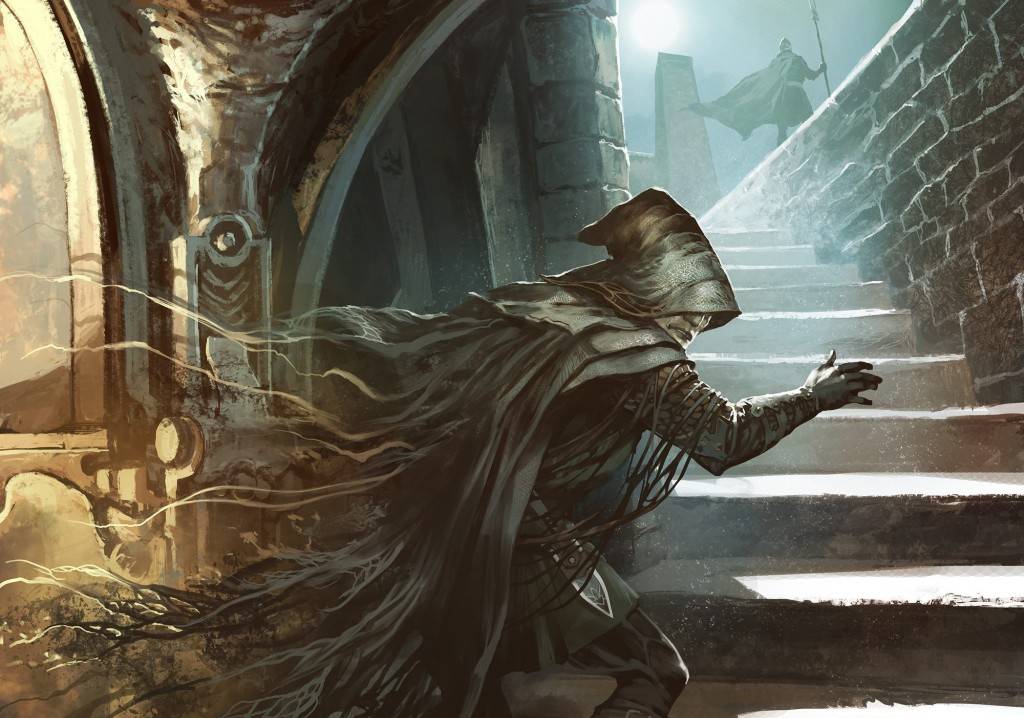
Avoiding detection during a heist will likely be crucial for at least some of your mission. Luckily, there are several spells that can help keep prying eyes away from your operation. Spells like invisibility and greater invisibility are excellent for singular party members that need to avoid detection. However, they can be quite resource intensive if you need to cloak an entire party.
For missions where you need to stealth in with the whole party in tow, pass without trace offers a +10 to Stealth checks for an entire hour for creatures within 30 feet of you, allowing you to (hopefully) keep your entire party hidden from detection.
If you’re looking for more of a “hide in plain sight” vibe, disguise self is perfect for when you need to blend in with the environment or take on the appearance of someone else. Warlocks can even pick up the Mask of Many Faces invocation, which allows them to cast this spell at will for extended infiltration missions. For situations where your use case is beyond a simple illusion for yourself, you could also look at alter self for a disguise that holds up to physical inspection or seeming if you need to disguise others.
In case of emergency scenarios where you’re on the brink of being detected, darkness, fog cloud, or even stinking cloud can obscure large areas, allowing for a quick escape.
Finally, this list of non-detection spells wouldn’t be complete without silence, which, while it may seem niche, is extremely versatile in a heist. You can disable sound-based alarms, deafen the sound of your knock spell, and even cloak the sounds of combat if it breaks out.
Causing Distractions
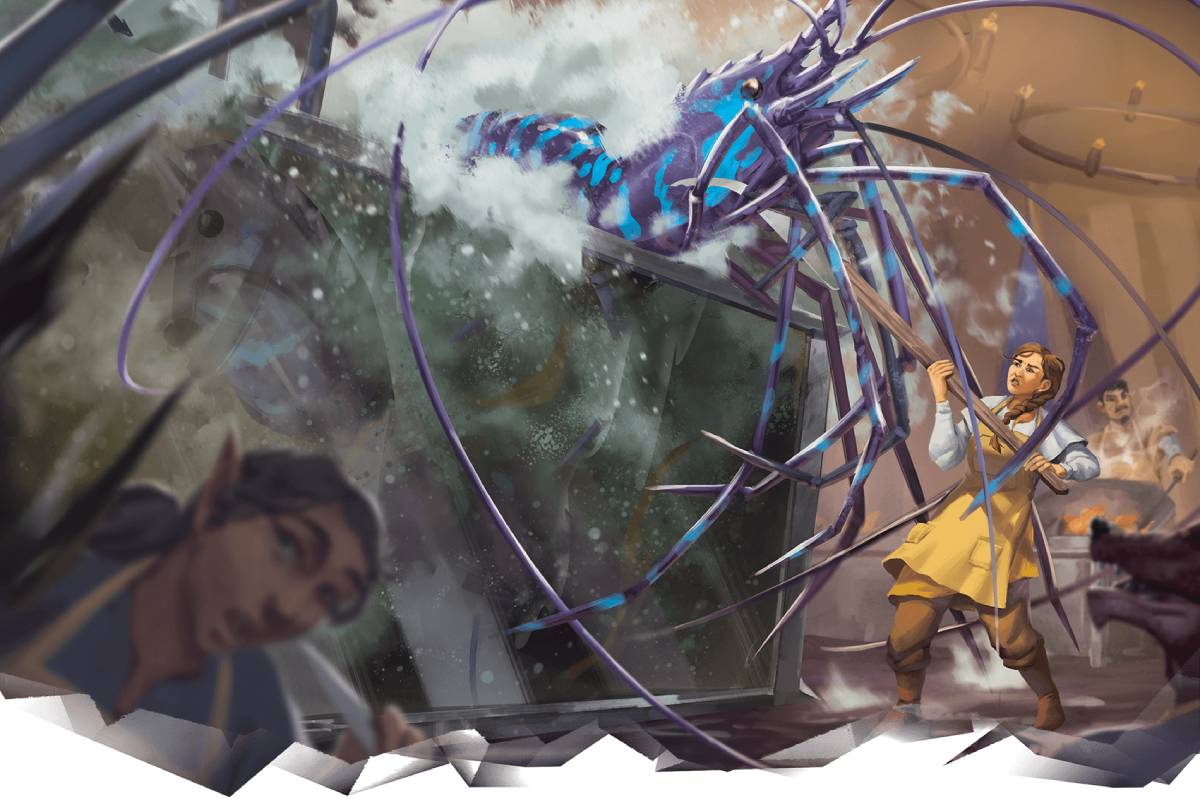
Causing a distraction can be a solid strategy when navigating a well-guarded area. Minor illusion and silent image are reasonable low-level options that can create minor visual or auditory illusions, distracting guards and leading them away from your intended path.
If you need movement, sound, and other sensory stimuli for your illusion to be effective, major image is a more potent option that will cost you a 3rd-level spell slot. While creating an illusion that can affect multiple senses may draw attention better than a silent or non-moving one, it can still only occupy a 20-foot cube, and you’ll need to stay within 120 feet and use your action to keep it animated.
Speaking of animated illusions, mislead is a 5th-level spell that allows you to create a perfect copy of yourself that can move independently, gesture, speak, and even relay what it currently hears and sees. This can be a perfect way to get guards to chase your duplicate, and seeing as the spell also turns you invisible when you cast it, it allows you to slip past any remaining guards unnoticed.
For not-so-subtle distractions, there are few options that will cause as big of a bang for your buck as conjure animals. This spell is the perfect perpetrator of chaos and confusion, allowing you to create anything from eight eagles, for when you need feathers and noise, to two brown bears, for when you need to clear a room real quick.
Detecting Threats
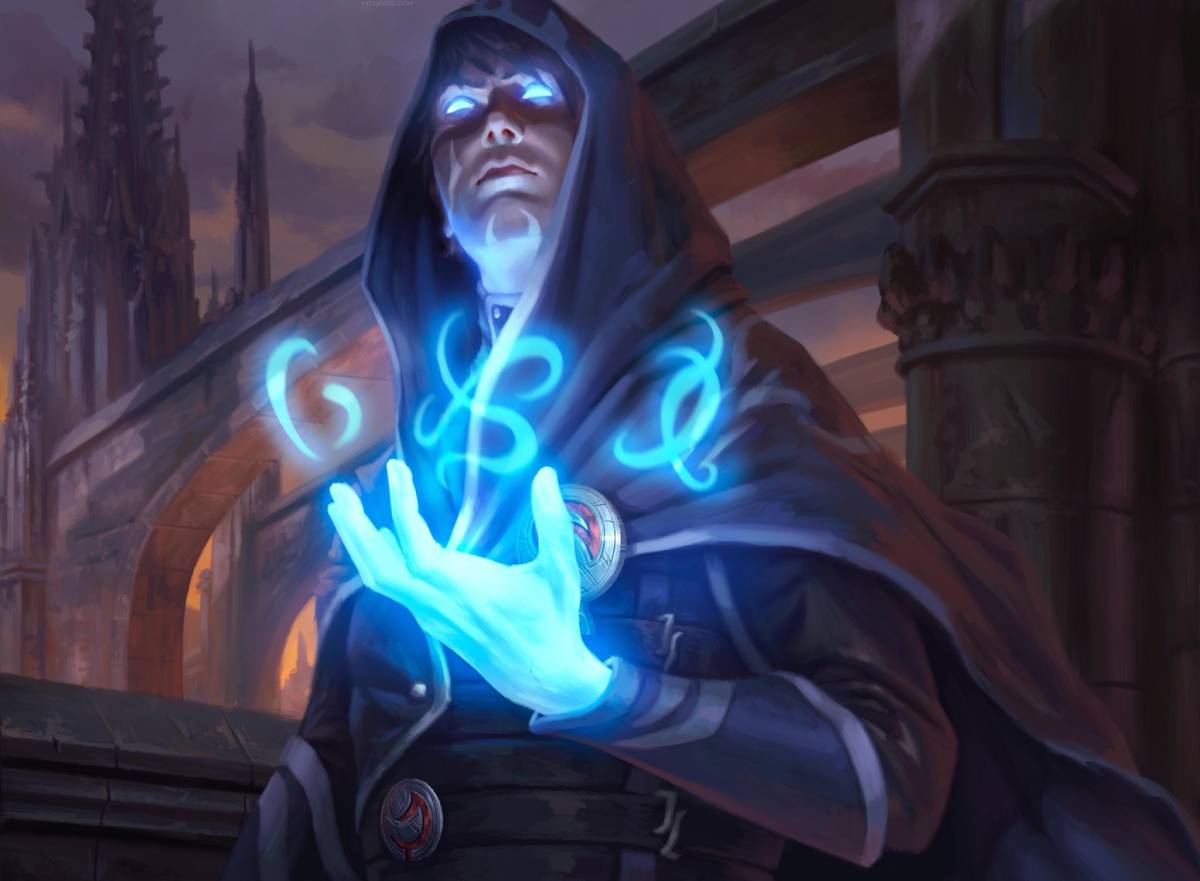
When infiltrating a high-security environment, it’s a good idea to keep an eye—or in this case, your magical senses—out for danger.
Detect thoughts is a neat 2nd-level spell that can be used to read the surface thoughts of those around you, allowing you to gain insight into potential security measures. It’s also helpful in detecting unseen enemies within 30 feet of you, as long as they're not standing behind 2 feet of rock, 2 inches of metal, or, gods forbid, a thin sheet of lead.
Detect magic, on the other hand, is a similarly helpful 1st-level spell that can reveal magical auras and give you an idea of any enchanted objects or spells in the area, helping you to avoid traps. It’s also excellent for looting the vault after you’ve broken in, as you’ll be able to pinpoint which objects are magical and, therefore, the most valuable. Even better, this spell can be cast as a ritual and has a 10-minute duration, so if you have 10 minutes to kill while your rogue buddy is off picking locks, you won’t have to burn a spell slot.
Another 1st-level ritual spell that will undoubtedly come in handy is find familiar, which can be used to summon an animal buddy to scout ahead while you sit back and relax. This works exceptionally well while you’re within 100 feet of your familiar as you can see and hear what it encounters and communicate telepathically with it. Even when you’re outside the range, it can still follow a task you set and report on what it finds.
Coming in at the higher investment of a 4th-level spell slot, arcane eye is considered the ultimate scouting tool. It’s an invisible, magical eye that has darkvision, can fit through gaps as little as 1 inch, and has no limit on how far away it can go. This allows you to see almost anywhere and gather valuable intel from a safe distance. You could even combine it with the Observant feat to read lips, which will compensate for the fact that your arcane eye doesn’t relay audio.
Removing Roadblocks
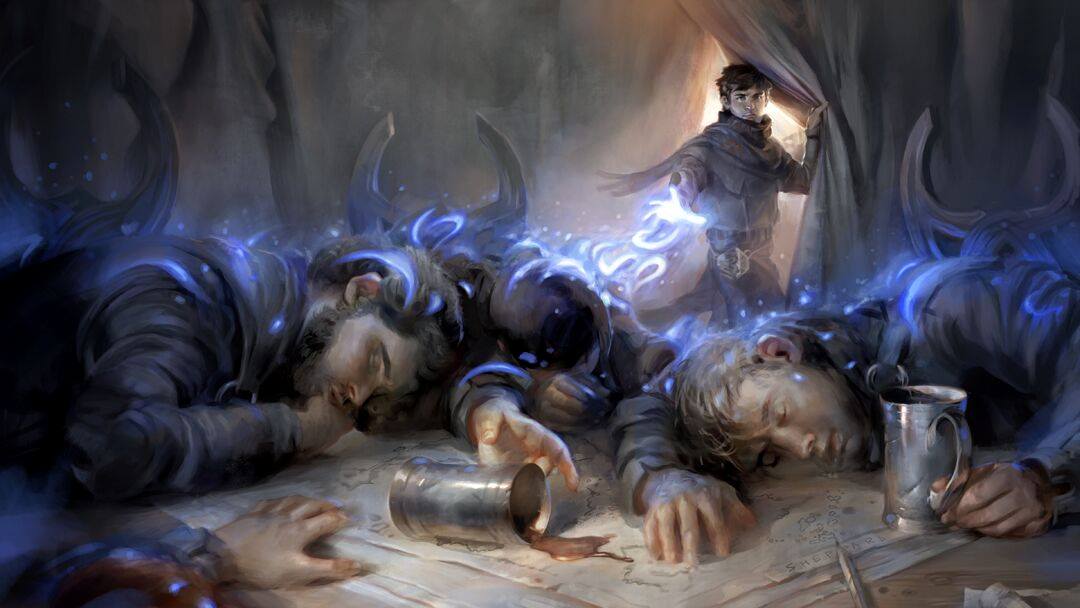
There are always twists and turns when pulling off a heist, and these spells will be crucial when you hit those inevitable roadblocks. Polymorph and banishment are probably the best single-target removal spells, though they're quite resource intensive at a 4th-level spell slot and require concentration for the entire duration.
If you’re looking for a lower-level solution, phantasmal force is sort of like a single-target major image that can inflict damage and, hopefully, send your target running. Speaking of lower-level solutions, sleep is probably the most effective, violence-free option as long as you’re dealing with enemies with smaller pools of hit points. As a 1st-level spell, it can knock out creatures with a combined hit point total of 22 on average, which can easily deal with a couple of guards.
Charm spells like charm person and suggestion are other excellent routes that can be used to mollify suspicious guards or even turn them into allies. If you’ve really bungled the heist and need to erase the events of your missteps from an onlooker’s mind, modify memory is an effective option that comes at the steep cost of a 5th-level spell slot.
When you encounter arcane obstacles, there’s no better way to deal with them than dispel magic. This catch-all spell can deactivate arcane barriers, incapacitate animated defenses, and shut down magical traps, so it’s definitely worth stocking if you’re trying to steal anything from a location you suspect might have magical defenses.
Infiltrating and Escaping
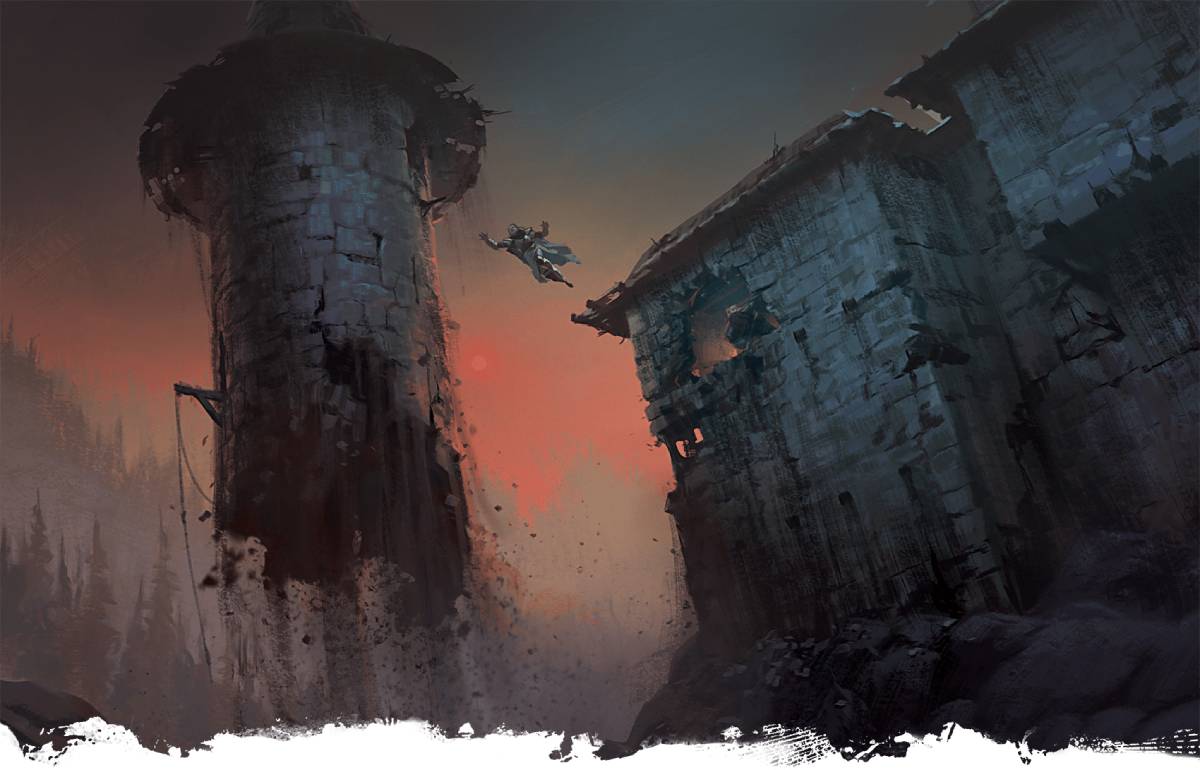
When planning a heist, you need to think outside the box. Sure, guards are observing the floor-level entrances and exits, but are they prepared for a big-brained team of geniuses that plan to dimension door 500 feet into the air, then paradrop with feather fall through the skylight? Didn’t think so. Fly, levitate, and spider climb are other (read: safer) methods of using elevation to your advantage, allowing you to exploit unsupervised windows, balconies, and air vents.
For making a quick escape, there are few options better than misty step, which can be used as a bonus action to teleport 30 feet even after you’ve used your movement and action to Dash. Unfortunately, the biggest downside of misty step is that you can only teleport where you can see. If your escape is blocked by an unscalable wall, gaseous form, or etherealness if you have a 7th-level spell slot hanging around, are the gold standard for bypassing physical obstacles.
Knock is another must-have spell in case you find your way blocked by a lock your rogue can’t crack. It can also be used to suppress arcane locks. But be careful. The spell’s stealthiness is impeded by the fact that it produces a loud knock that can be heard 300 feet away, so use this spell with caution. If you just want to skip the whole process of locks altogether, you can simply make your own door with stone shape or passwall, which are the types of spells that make your DM put untransmutable walls in every dungeon your party enters thereafter.
Working Together

Teamwork is imperative for a successful heist (there’s a reason that every good heist movie has a sequence of getting a team together). Usually, each team member needs to succeed in their area of expertise for the plan to work. If you’re looking to help out your teammates, the guidance cantrip can give them a small but crucial bonus to their ability checks. If they need a more considerable boost with a longer duration, enhance ability can provide advantage on checks made with a specific ability, great for when your rogue has some sneaking or your bard has some convincing to do.
If your fantasy world doesn’t have walkie-talkies for your team to stay in touch, message and sending can be used to communicate with your party at a distance, allowing you to coordinate your movements and share information without alerting guards or drawing attention to yourself. If you're going to be splitting up for longer periods of time, investing in the 5th-level spell telepathic bond may also be prudent.
Though it’s typically used as an offensive option, hex is another solid teamwork spell, especially during heists. The spell’s secondary effect provides disadvantage on checks made with certain abilities, so it can be used to hinder the target’s attempt to sleuth out a stealthing party member.
Spell Out Your Plan
When it comes to pulling off a successful heist in D&D, the right spells can make all the difference. Hopefully, this article has provided some food for thought and given you some spell choices to mull over for your next heist.
Remember, you can never be too prepared, and it never hurts to have a contingency plan in place—speaking of contingency, be sure to have that spell ready in case things go awry!
Mike Bernier (@arcane_eye) is the founder of Arcane Eye, a site focused on providing useful tips and tricks to all those involved in the world of D&D. Outside of writing for Arcane Eye, Mike spends most of his time playing games, hiking with his girlfriend, and tending the veritable jungle of houseplants that have invaded his house.








-
View User Profile
-
Send Message
Posted Apr 21, 2023Love this, Mike!
-
View User Profile
-
Send Message
Posted Apr 22, 2023if knock isn't on this list i'll go insane
edit: it was
-
View User Profile
-
Send Message
Posted Apr 22, 2023Enlarge/Reduce to shrink a door
-
View User Profile
-
Send Message
Posted Apr 22, 2023An unfortunate example of just how versatile spells are compared to martial options.
-
View User Profile
-
Send Message
Posted Apr 22, 2023I'd take Arcane Lock as well for when you need to keep guards out the room you're in just in case.
-
View User Profile
-
Send Message
Posted Apr 22, 2023Jace Beleren under detecting threats?
-
View User Profile
-
Send Message
Posted Apr 23, 2023Fireball and only fireball.
If that doesn't work try another fireball.
-
View User Profile
-
Send Message
Posted Apr 23, 2023The fact that locate object isn't anywhere in this article says a lot about how inflated people's perceived knowledge about this game is.
-
View User Profile
-
Send Message
Posted Apr 24, 2023Friends to get past the one guard to make your escape
-
View User Profile
-
Send Message
Posted Apr 25, 2023Give martial classes some credit; a lot of the more impressive spells here are at least 5th level, which means the caster would have to be at least 9th level to cast them once per long rest. At 9th level, martials can do some pretty impressive things themselves:
-A monk at 9th level can dash 90 feet up a vertical surface, then slow fall down the other side with a near certainty of avoiding fall damage. They don't spend any resources to do this; they can do it every turn if they want.
-A rogue at 9th level has 4 Expertises, each of which adds +8 to the relevant skill check. That's dramatically stronger than advantage under most circumstances. This makes a rogue with expertise in persuasion mathematically more likely to succeed on a persuasion check than a Wizard with Charm Person; a rogue with Expertise in stealth and at least +3 Dex is more likely to succeed on a stealth check than a Wizard under Pass Without Trace. And again, this doesn't cost you a resource; you just have it all the time. This isn't even getting into some of the cool things Rogue Archetypes let you do, like the Assassin's Infiltration Expertise or the Inquisitive's Ear for Deceit.
-A fighter at 9th level, admittedly, probably doesn't have any inherent class skills that make them super equipped for a heist. But! They do have 4 opportunities to take the Ability Score Improvement feature, and therefore, up to 4 opportunities for cool Feats like Observant, Keen Mind, or Actor. Some Martial Archetypes also have relevance to a heist setting, like the Champion's Remarkable Athlete or the Samurai's Elegant Courtier.
-A barbarian at 9th level... is a great distraction. See! Everybody can contribute!
-
View User Profile
-
Send Message
Posted Apr 25, 2023Thank you for this! I told my party to think stealthy heist, not a hack & slash session. This will definitely help.
-
View User Profile
-
Send Message
Posted Apr 26, 2023With Detect Thoughts, the target knows you are manipulating it, so even if you are hidden and using it to detect creatures, they are now aware of you.
-
View User Profile
-
Send Message
Posted Apr 27, 2023That's only if you make the attempt to probe deeper into their mind, prompting the save. Surface thoughts and detecting thinking creatures is safe enough, as long as you're not obviously casting the spell in front of them.
-
View User Profile
-
Send Message
Posted Apr 27, 2023Not a bad list, but conspicuously missing Find Traps and Locate Object.
-
View User Profile
-
Send Message
Posted Apr 28, 2023I love, love, love this article. It's a great list of suggestions for a caster. Also like the comments that mention other classes.
-
View User Profile
-
Send Message
Posted Apr 28, 2023Magic is more versatile than pure martial ability yes but there's still plenty of martial abilities you can use which can have advantages over spells. Lockpicking is often the superior option to knock for speed or stealth and the general lack of resource consumption means martial solutions are consistently available. I wouldn't underestimate the value of a monk or rogue for committing the infiltration as they have reliable ways of overcoming obstacles and good saving throws if things go wrong. Dex fighters can be useful for strategies using finesse like firing a rope arrow for the monk to run across or taking out lights from a distance while Strength fighters can open up new pathways or keep some shut in the face of a pursuer. Path of the beast barbarian could use their adaptations to overcome ground based obstacles without anyone needing to expend a spell slot or a battlemaster fighter could use their superiority dice for ambush to remain undetected or disarming strike to seize a key in a smash and grab style heist (or other perception based skills to identify threats and opportunities). Plus any decent vault likely has some countermeasures to foil magic ingress and having someone on hand to puncture lead sheets or crack stone walls can allow magical party members to get more bang for their spell slot. Fighters with action surge could potentially use their action economy to cause a distraction or occupy multiple individuals (or grapple then dash away with someone important) which could also be done with magic but will likely be more consistent with a fighter with buffs to their attack rolls from their fighting style. Failing that, martials are excellent for incapacitating guards in a nonlethal manner if no one has sleep or hold person is inefficient/impossible (all the guards might be fey for instance). There's usually a potion, scroll or item to replicate most magical abilities but it's surprisingly difficult to get a substitute for a good martial, especially if you are magically buffing them (haste on a warlock is good, haste on a barbarian, monk or paladin is generally better).
-
View User Profile
-
Send Message
Posted Apr 28, 2023Well answered. I had a go at responding to that myself but you seem to have done a good job with providing examples. I think the action surge of fighters can make them discount monks in a pinch while fighting styles can help allies or add massive bonuses to certain checks such as history or stealth (the fighting style which gives you battlemaster manoeuvres). Otherwise, archery gives you consistency if you're going for a precise shot or the more lethal infiltration approach. Barbarians are naturally fast with good jumping without resource expenditure and can get bonuses from their subclasses too. For instance a totem warrior barbarian can see fine detail up to 1,000 feet away and has no disadvantage on perception checks in dim light making them good for casing without arousing suspicion. Depending on the DM you might also appreciate a martial in an environment where enemies are likely to hear the verbal component of spells over the simple expediency of bashing someone over the head with a club or a punch.
-
View User Profile
-
Send Message
Posted Apr 28, 2023I appreciate your humour friend. Locate objects is invaluable for actually finding the vault but find traps is a joke spell. For a second level spell slot you learn if there are deliberate traps within line of sight for 120 ft around you and the approximate nature of the traps but not where they are. That means you need to recast it every time you get to a doorway or 120 ft away and it won't pick up unintended traps like if someone had left noisy trash (like water on the floor making loud splashing) around or a less maintained section of venting which is prone to give way.
-
View User Profile
-
Send Message
Posted May 1, 2023Probably the best gameplay advice article that's ever been posted on this website. I can genuinely see players and DMs alike having cause to reference it for storylines. The information is well-formatted; concise; informative. Great work! :)
-
View User Profile
-
Send Message
Posted May 1, 2023Dispel Magic is awesome for Alarm or even Animated Armor.